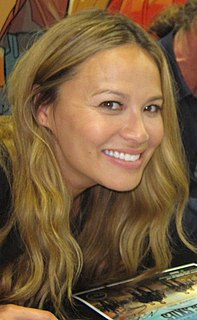A Quote by Jill Stein
If you really want people to remain healthy, you can't just throw pills at people once they become sick, which I feel like I was doing as a medical doctor, so I began working on more upstream thinking.
Related Quotes
Sometimes, though, I feel that pushing books is a whole lot like pushing medicine. Think of books as pills. I have pills that cure ignorance and pills that cure boredom. I have pills to elevate moods and pills to open people's eyes to the awful truth: uppers and downers as they were. I sell pills to help people find themselves and pills to help them lose themselves when they require escape from the pressures and anxieties of life in a complex society.
What people really want to know from their doctor is, are you going to make me feel better? And what they really want to know from a president are, are you going to give me some security when it comes to my work? Because if I'm not working, my family is in trouble. And when I am working, the fact of the matter is, my whole family is doing better.
I know this is going to sound crazy, but I really love working out. I know that sounds sick to some people, but I didn't love it at first. It's become a healthy addiction for me. And like, now, if I'm watching TV on the couch I'm like, "Ugh, I could be on a cardio machine watching the same thing." That's just now how my mind thinks.
I'd been sick on tour for about two years with this medical anomaly that doctors couldn't figure out. That's a big part of my life: I just feel really sick a lot of the time and can't figure out why. I'd gotten these shots in Russia, where we'd just been. It was just heavy. It's just heavy performing for people who really care about you, and you don't really care that much about yourself sometimes.
There's a lot of pressure to look good, have the gun, know what you're doing and be one of the boys. I was like, "I don't want to be one of the boys. I want to be a doctor. I want to be cerebral. I want to sit back and just use something else. I don't want to do the stunts. Let the boys do that. I'm just going to be the doctor who's about taking care of other people."
I really do love doing stand-up, and I don't see why it should affect the acting. And I just want more interesting jobs. I just want to keep doing stuff that's different, rather than saying, "Okay, I've become known for this, and I'll just do this from now on." If I feel like I've done this one thing, I never want to do it again. I want to do something totally different.
The one nice thing about doing a character for a long time is, you begin to feel more comfortable, and you are thinking less and behaving more. It's always best not to be thinking a hell of a lot while you're acting, because you want it to be as spontaneous as possible, not too intellectual. Just behaving and listening to other people who you're doing scenes with. I always like the latter when it looks easy, even though it may not be.
I used to be embarrassed because I was just a comic-book writer while other people were building bridges or going on to medical careers. And then I began to realize: entertainment is one of the most important things in people's lives. Without it they might go off the deep end. I feel that if you're able to entertain people, you're doing a good thing.
Once you start to ask patients about their priorities, you discover what they're living for. Once you uncover that, it helps you, as a doctor, decide what to fight for. And when we do that, we often end up identifying limits to the kind of care that people want. One's assumption is that these people are going to live shorter lives, but what we're doing is protecting quality of life. In doing so, you sometimes end up helping people live longer. Certainly, you help people live better days and with more purpose in their lives.
A good collaboration I think it's really, truly a vibe thing. The people who are most excited about collaborations are people in the business, people who are thinking, "This is going to be great press," or, "This is going to expose you to all these people you haven't reached before." I prefer not to think like that. I'm more, if you meet the person, you like the person, you've talked to them, you feel connected, you feel like there's a creative exchange, then it kind of happens by itself. I'm open to it, but it has to feel right. If it feels forced, then I'm fearful of doing it.
































